Tom's Hardware Verdict
Corsair's RTX 3090-packing Vengeance i7200 is a powerful performer in a pretty package. Those who care at all about value will want to opt for the 3080 option rather than our $4,500 configuration, though it's hard to knock the 4TB of NVMe storage.
Pros
- +
Top-tier performance
- +
Attractive, well-cooled case
- +
4TB of fast NVMe storage
Cons
- -
Expensive for the performance and parts
- -
Only eight total USB ports
Why you can trust Tom's Hardware
Nvidia's latest high-end Ampere GPUs sit pretty on our best graphics card page, and the RTX 3090 specifically sits atop our GPU benchmark hierarchy, but these cards remain next to impossible to buy at or near their MSRP. One solution would of course be to wait -- both for better stock and for AMD's imminent competing Big Navi/6000-series cards. But if you need that high-end gaming experience now, buying a prebuilt system like Corsair's Vengeance i7200 might be your best bet.
This Vengeance chews through AAA titles with ease and looks great doing it, thanks to its pairing of an MSI-made RTX 3090 and an Intel Core i9-010850K. You also get a pair of speedy Force MP400 SSDs (for a stunning 4TB of solid-state storage) and a generous 64GB of RGB RAM clocked at 3200MHz. The whole thing is housed in the excellent 4000D Airflow case with six quiet RGB fans and a 240mm AIO cooler.
At $4,499 in this configuration (CS-9050001) though, it's also extremely pricey. Those who want most of the gaming performance while spending less can opt for a 3080-based model with less RAM and storage for a more reasonable $2,799. But as much as we like the Corsair case and components, iBuypower offers up a similarly powerful RDY IWBG207 for $2,200 -- although that system is also experiencing stock issues of its own.
Design of the Corsair Vengeance i7200
Regardless of which configuration of the Corsair Vengeance i7200 you opt for, you'll get Corsair's excellent 4000D Airflow case, which we liked for its clean aesthetics and tidy interior. Personally, I also like the easy access to dust filters at the front, top and bottom. But I'd prefer more connectivity than the single USB-A and USB-C ports up top, alongside the headset jack, power and reset buttons.
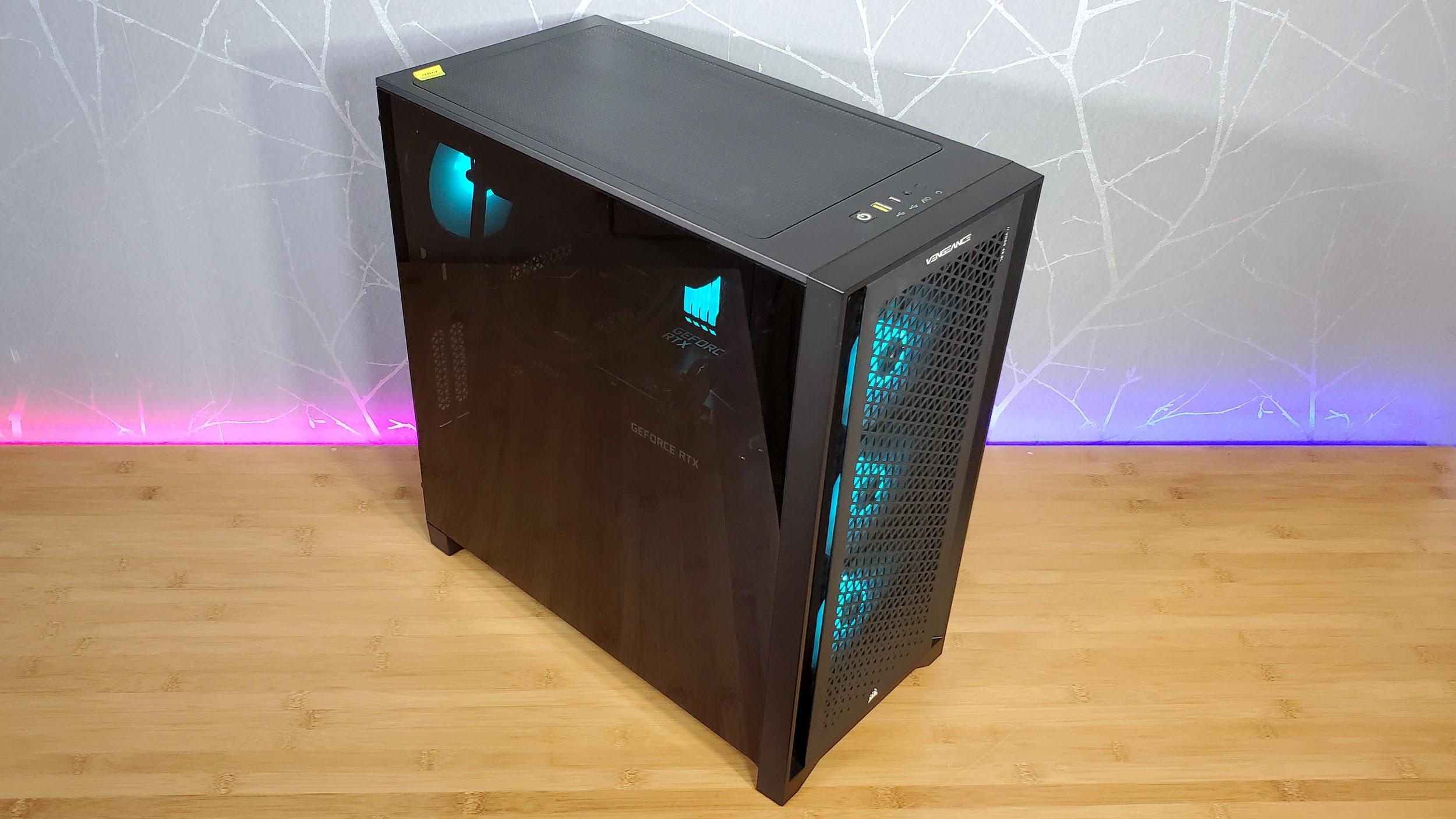
External expansion options are sufficient, if not exactly expansive around back on the MSI Z490-A Pro motherboard. You get five USB-A ports: two 2.0, two 3.1 Gen1 (3.0), and one USB 3.1 Gen2 (10Gbps) port. Also out back is a 10Gbps USB-C port, a PS/2 port for ancient peripherals and a six-port audio stack (no SPDIF). The board also has HDMI and DisplayPort connectors, but you'll want to instead use the trio of DisplayPort 1.4a ports or the single HDMI 2.1 port on the RTX 3090 graphics card for your display needs.
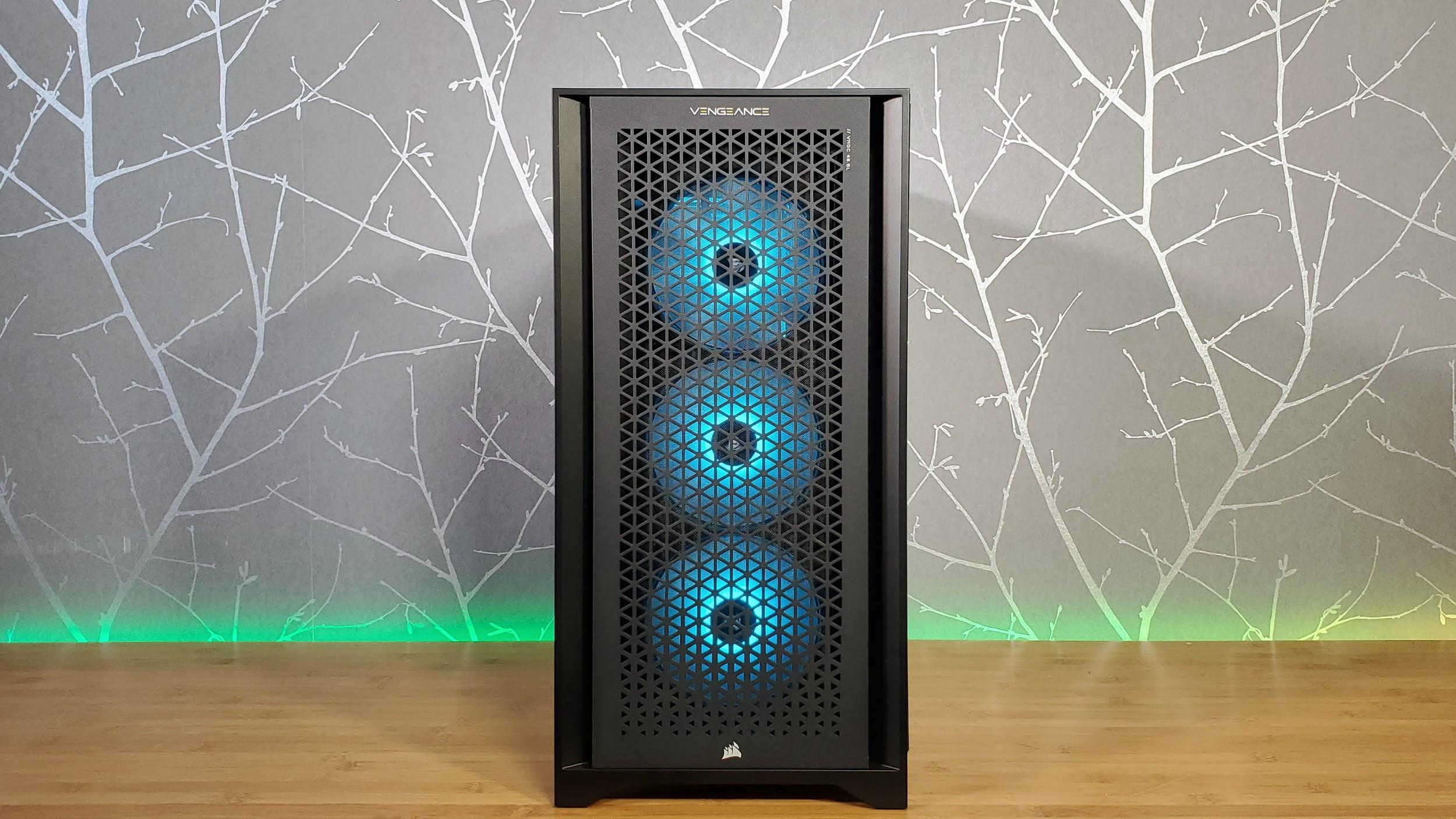
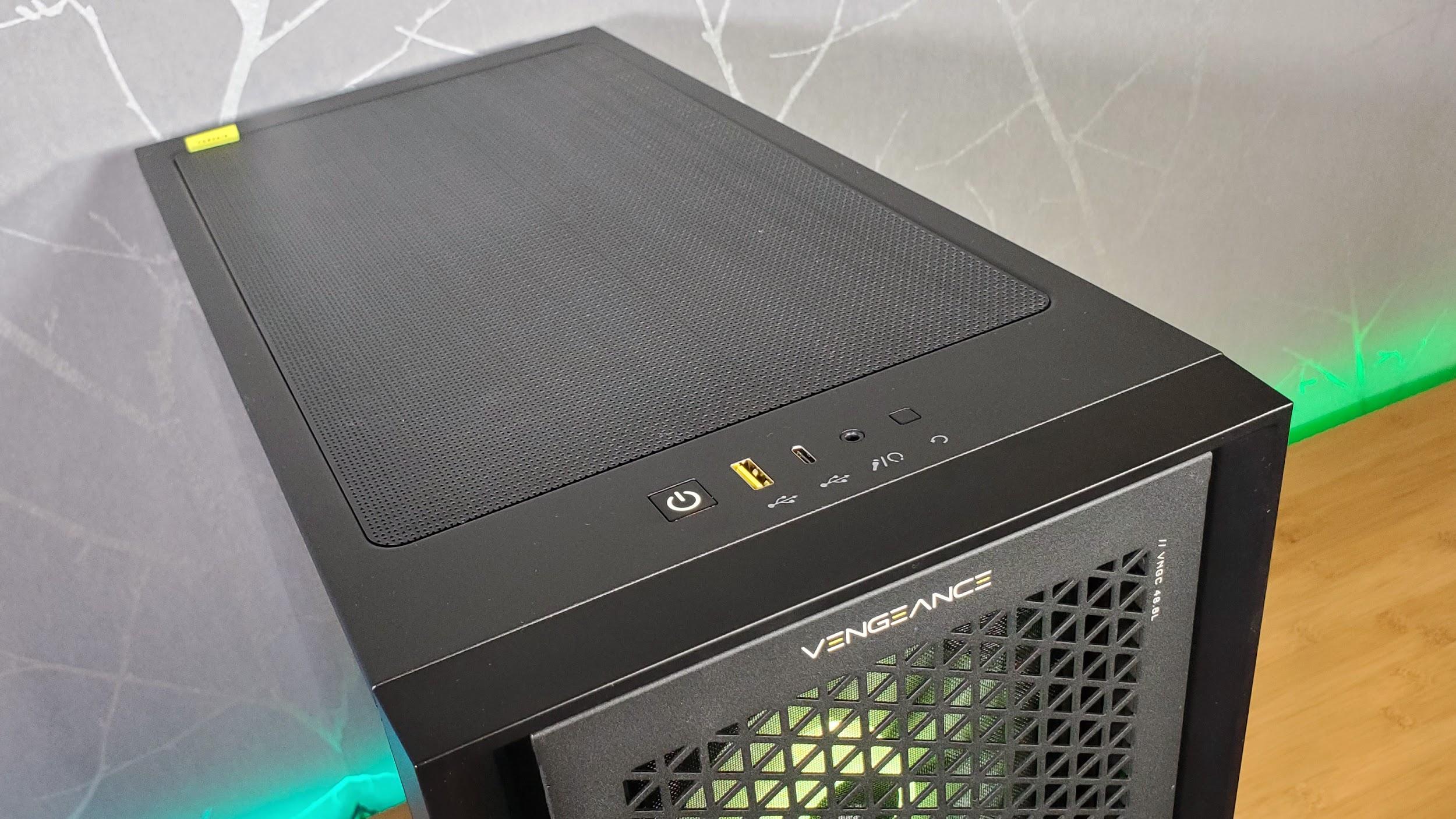
Specifications
| Processor | Intel Core i9-10850K |
| Motherboard | MSI Z490-A Pro |
| Memory | 64GB Corsair Vengeance RGB Pro DDR4 3200 MHz |
| Graphics | MSI RTX 3090 (24GB GDDR6X) |
| Storage | 2x 2TB Corsair Force MP400 NVMe SSDs |
| Networking | 2.5GB Ethernet, Asus Wi-Fi 6 AX3000, Bluetooth 5 |
| Front Ports | 1x USB 3.1 Gen1 Type A, 1x USB 3.2 Gen2 Type C |
| Rear Ports (Motherboard) | 1x PS/2, 2x USB 2.0 Type-A, 2x USB 3.2 Gen 1 Type A, 1x USB 3.2 Gen2 Type C, 1x USB 3.2 Gen2 Type A |
| Row 8 - Cell 0 | 2.5Gb Ethernet, 6x Audio jacks, Video Output (GPU), 3x DisplayPort 1.4a, 1x HDMI 2.1 |
| PSU | Corsair RM1000X |
| Case | Corsair 4000D Airflow |
| Cooling | 240mm AIO, 6x 120mm Corsair SP RGB fans |
| Operating System | Windows 10 Home |
| Dimensions | 17.8 x 18.3 x 9.1 inches / 452 x 466 x 230 mm |
| Price As Configured | $4,499.00 |
Upgradeability on the Corsair Vengeance i7200
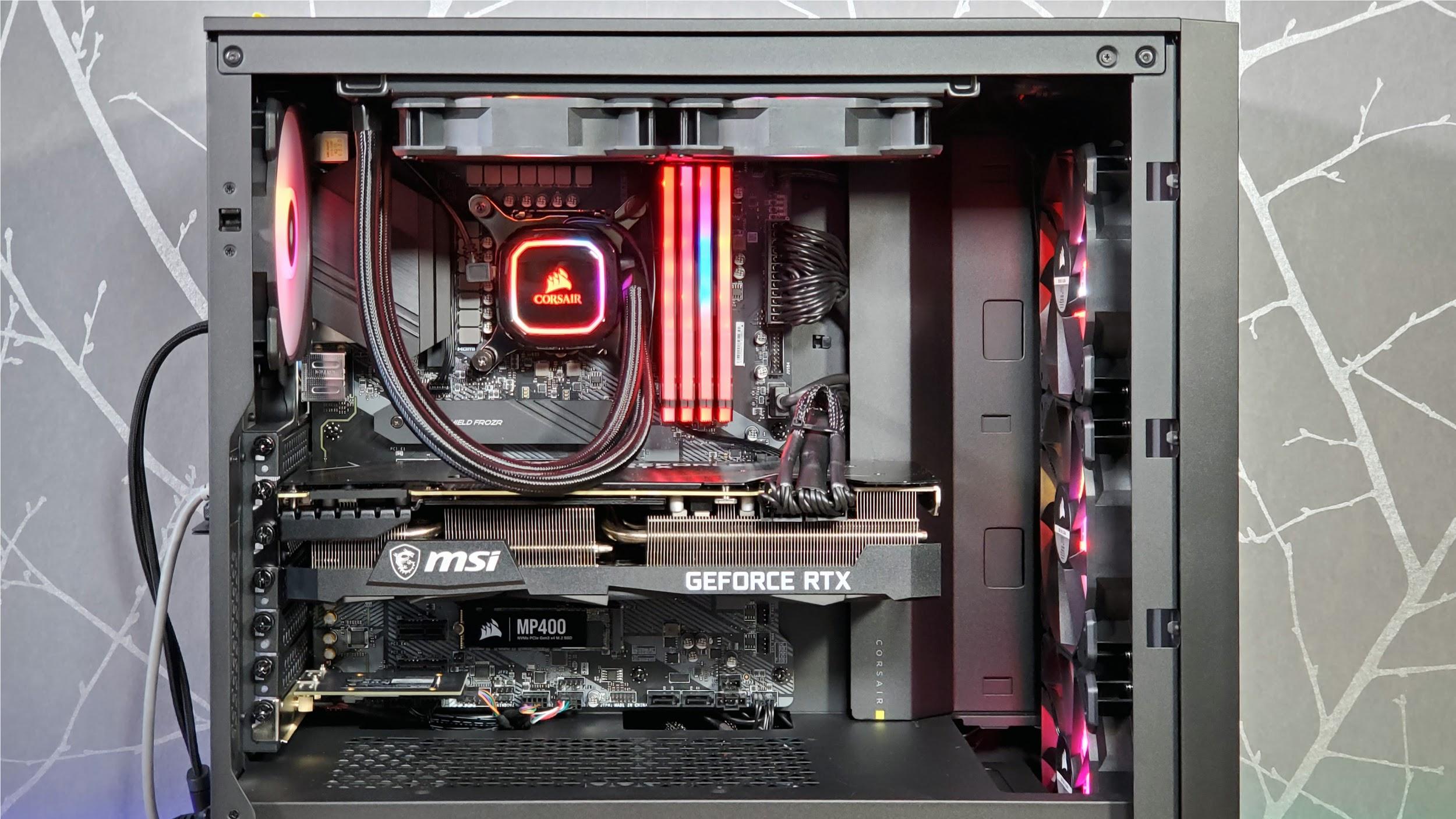
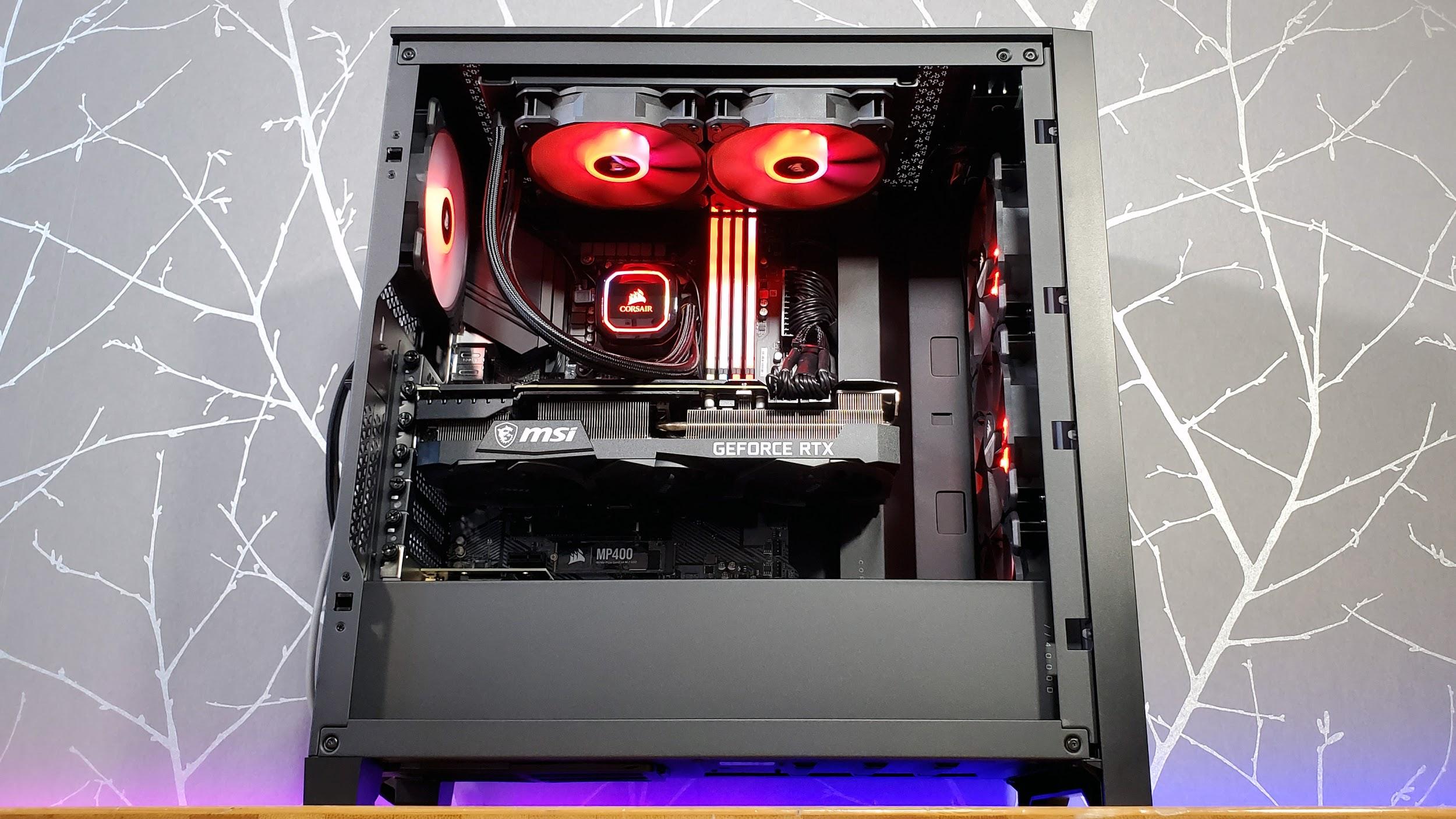
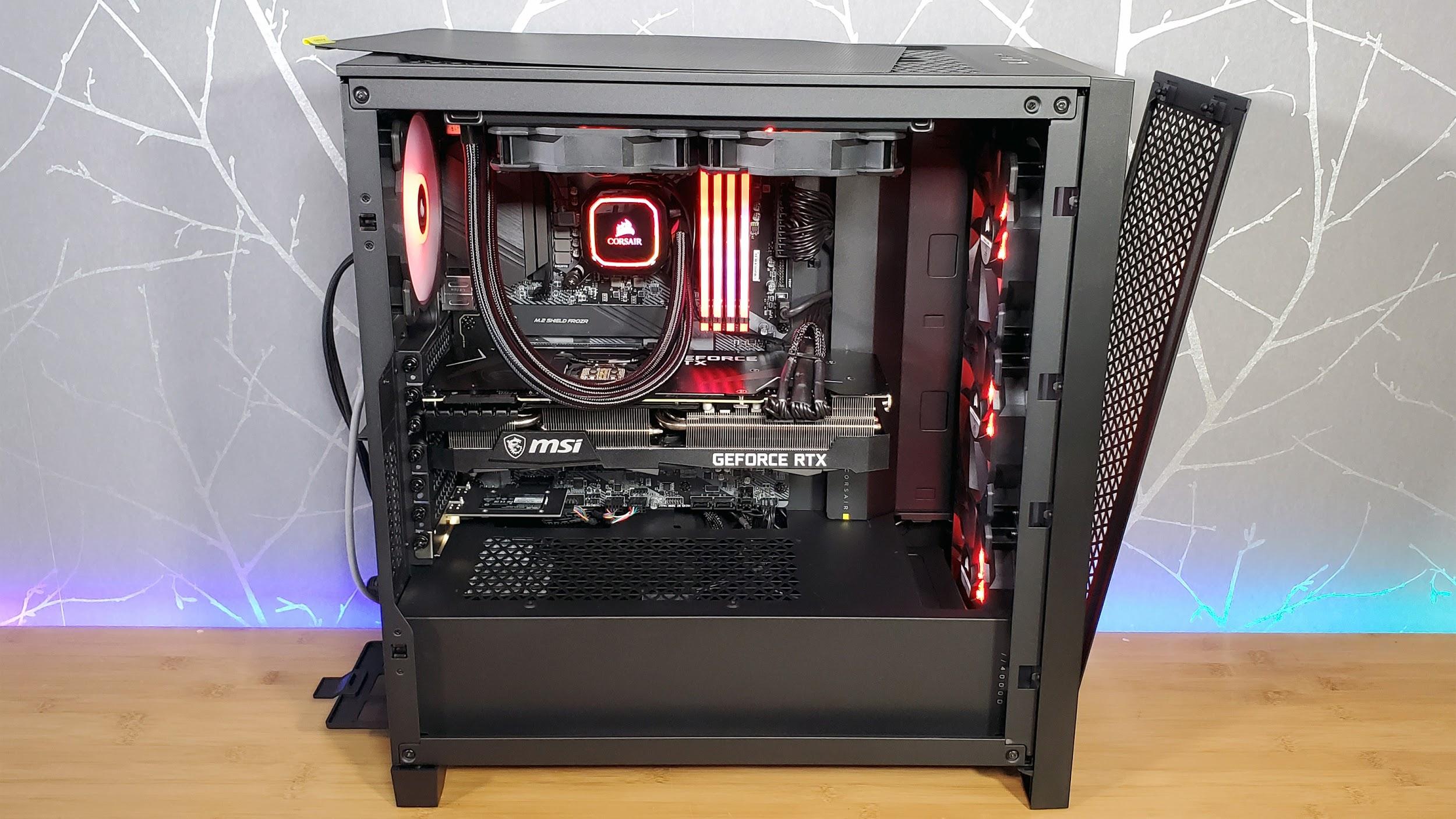
With two roomy SSDs, a high-end CPU and GPU, the Vengeance i7200 should serve you well for several years. But should you want to add more storage or other devices via card expansion, both an empty x16 slot and x1 slot are accessible, and all six of the SATA ports are ready for bulk storage. The case has mounting caddies for two 3.5-inch drives (under the PSU shroud) and two 2.5-inch drives (behind the motherboard). The 2.5-inch caddies can also be mounted atop the PSU shroud should you want to show them off. And getting the side panels off is as easy is loosening four retained thumb screws.
In a somewhat odd move, Corsair went with a MSI Z490-A Pro motherboard that lacks Wi-Fi and Bluetooth, instead adding it via an Asus AX3000 card that provides Wi-Fi 6 and Bluetooth 5.0. The motherboard does, though, have a 2.5Gb Ethernet port. So you can get speedy connectivity no matter how you connect to your network.
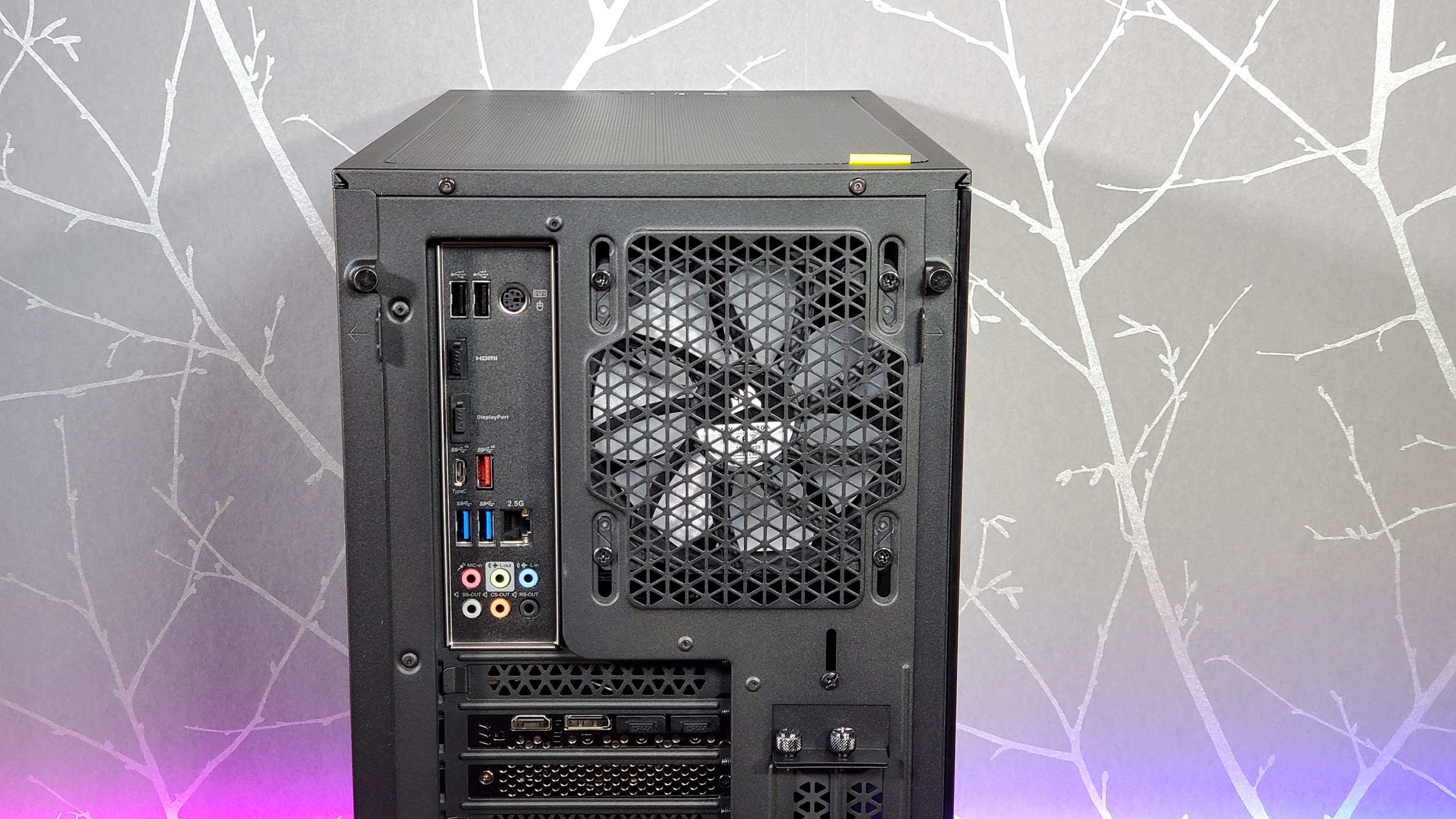
Gaming & Graphics Performance on the Corsair Vengeance i7200
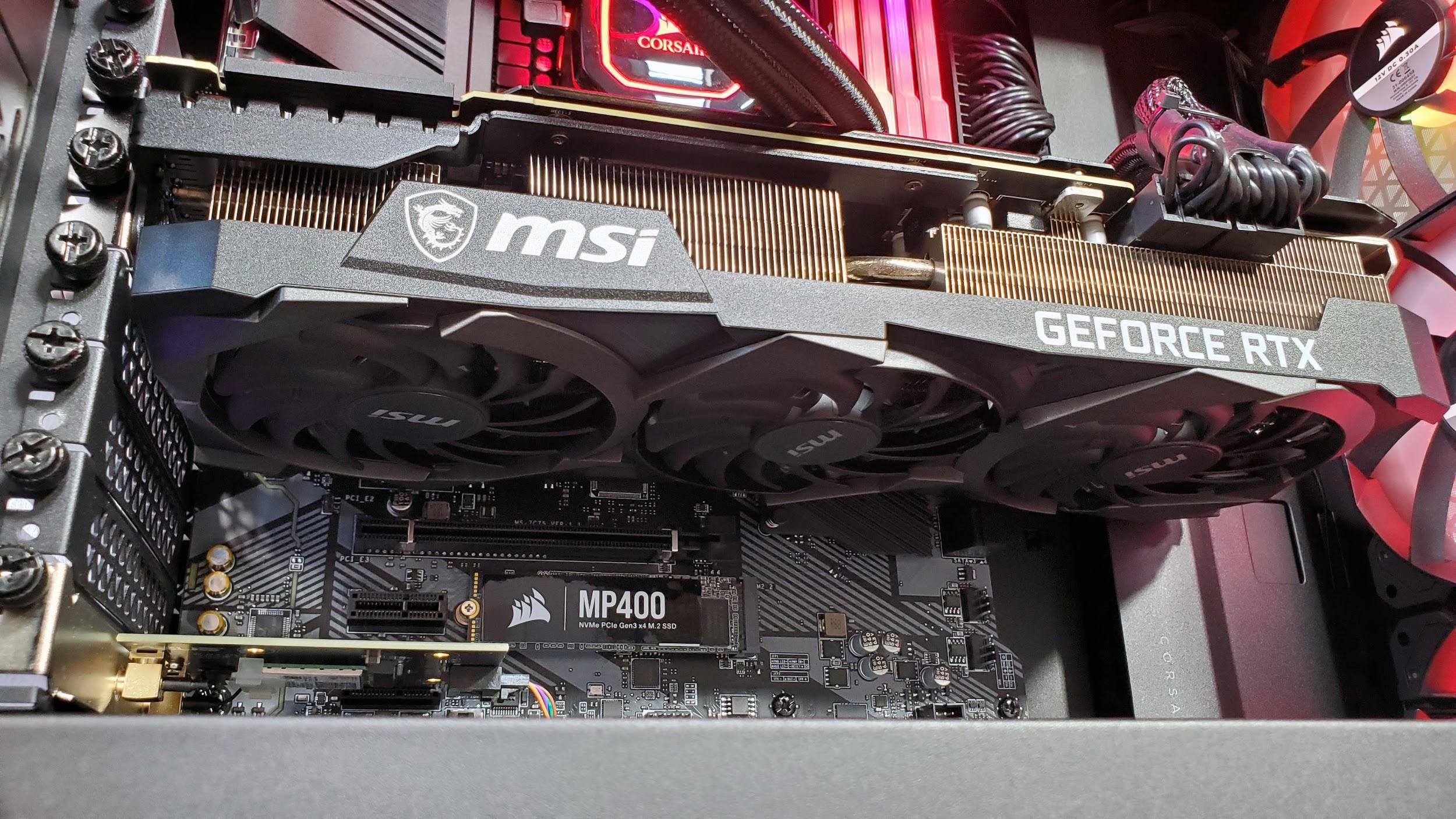
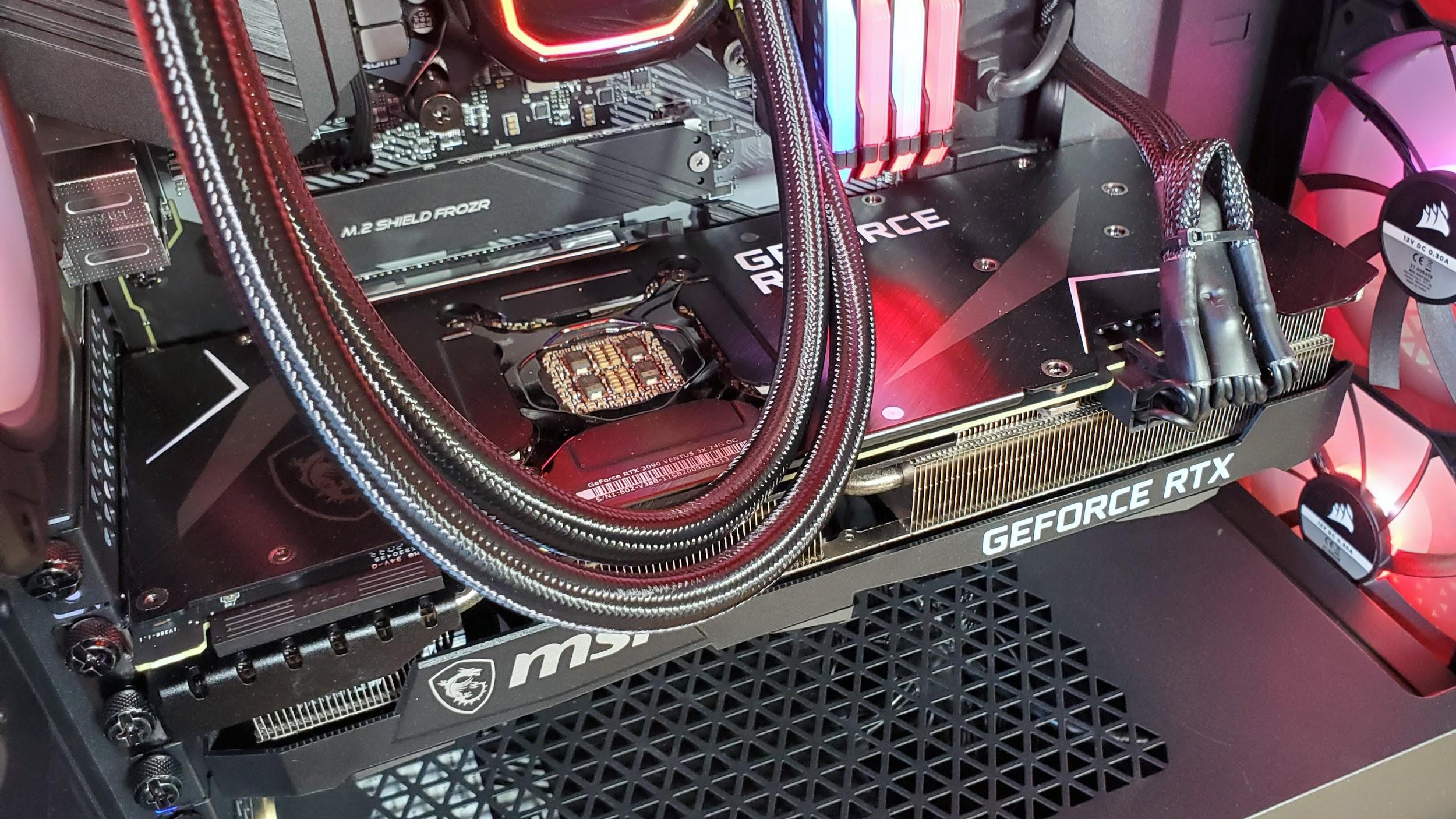
As you might expect given its pairing of one of Intel's best CPUs and Nvidia's $1,500 (if you can find it) RTX 3090, gaming performance is stellar. That said, the Vengeance i7200 faces stiff competition from similarly equipped machines we've tested recently. Alienware's Aurora R11 sports a custom-designed RTX 3090 of its own and a slightly higher-end Intel Core i9-10900K. And iBuypower's Gaming RDY IWBG207 pairs a 10900KF CPU with an RTX 3080. The latter system isn't quite as powerful, but it sticks close to the Vengeance and sells for $2,200, less than half the price of our Corsair system. Again, if you care at all about value, you should skip the RTX 3090 and opt instead for a 3080 or below. But the 3090 in the Vengeance can sure kick out frames, as we're about to see.
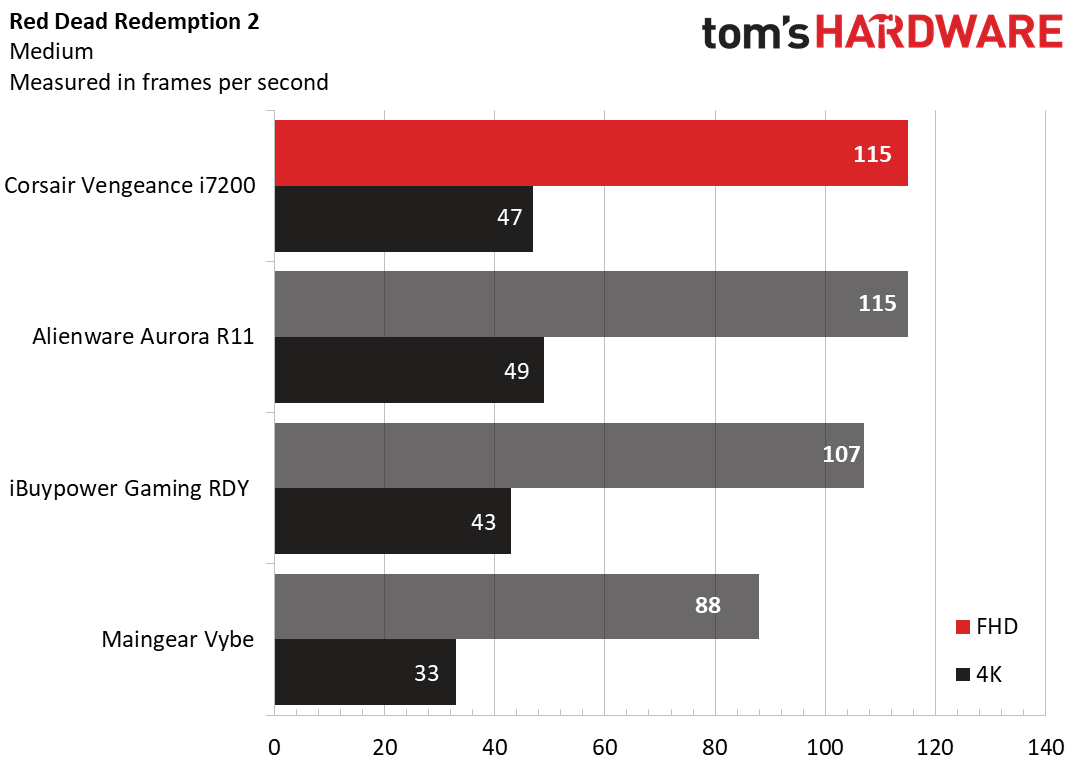
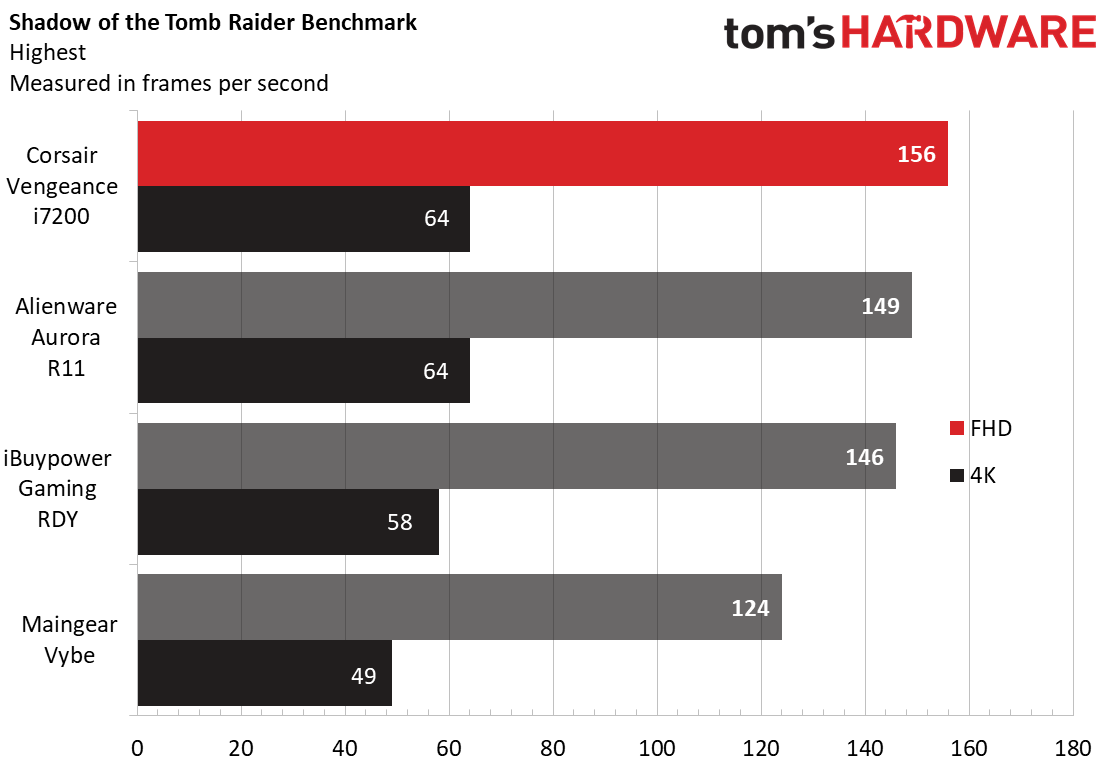
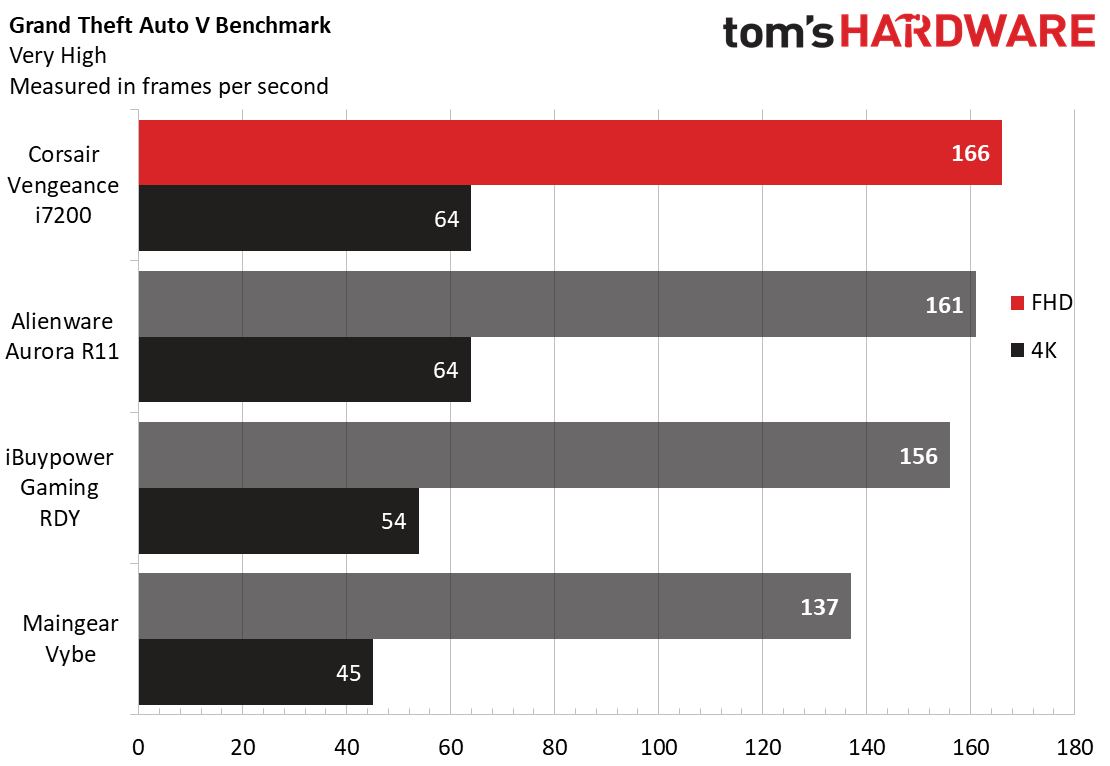
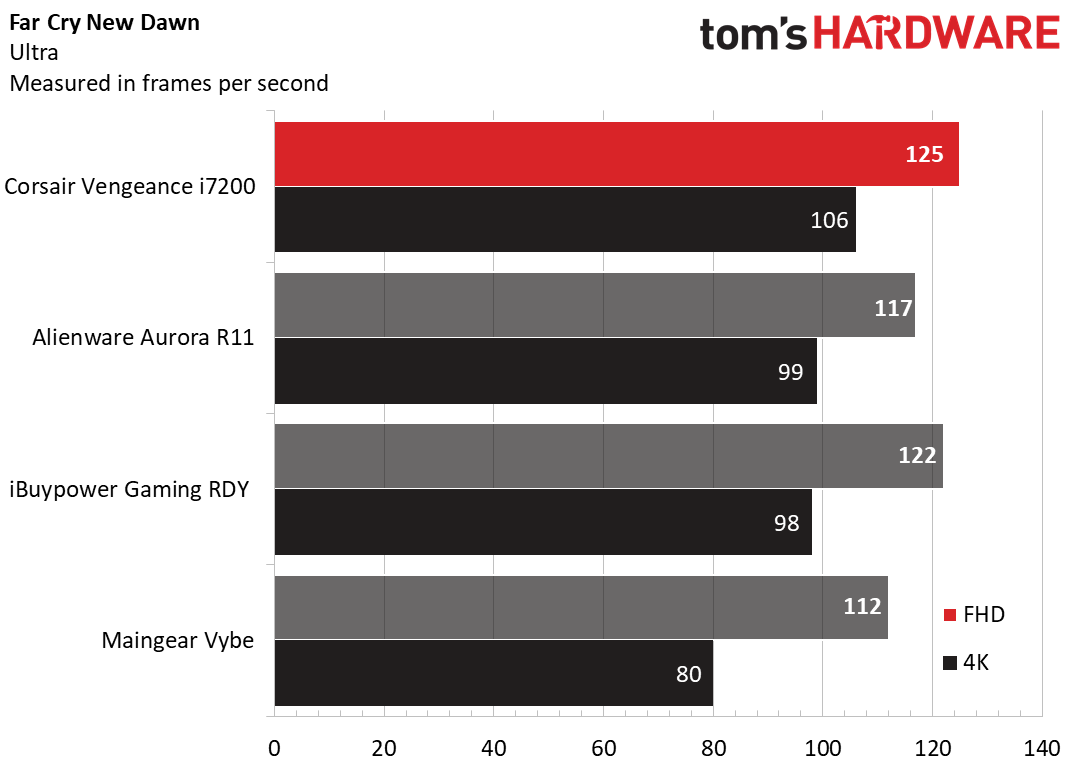
In Shadow of the Tomb Raider (highest settings), the Vengeance i7200 started off strong, surpassing the Alienware by 7 fps (frames per second) at 1080p and the 3080-powered iBuypower system by more than 10. At 4K the Corsair and Alienware systems were tied (unsurprising given their similar GPUs). The Maingear Vybe, with its previous-generation RTX 2080 Ti was significantly behind everything else here.
On Far Cry New Dawn (ultra), the Corsair’s 1080p score of 125 fps was again ahead of competing machines. And even at 4K, its score of 106 fps was 7 frames ahead of the Alienware, with its custom RTX 3090.
On the Grand Theft Auto V benchmark (very high settings), the 1080p trend continued, with the Vengeance i7200 again delivering a class-leading 166 fps, slightly ahead of the Alienware's 161. And once again, at 4K things were much closer. The Vybe’s 45 fps was playable, but only the 3090-based systems could top a smooth 60 fps here.
Red Dead Redemption 2 (medium settings) was the one test game where the Corsair Vengeance i7200 didn't lead. Its 1080p score of 115 fps was enough to tie the Alienware, but at 4K it fell a couple frames behind that system. And considering its $2,200 price, the iBuypower Gaming RDY system held its own here, landing just 4 fps behind the much pricier Corsair at 4K and 8 fps behind at 1080p.
We also subjected the Corsair Vengeance i7200 to our Metro Exodus gauntlet, in which we run the benchmark at the RTX preset 15 times to simulate roughly half an hour of gaming. On the test, the Corsair machine ran the game at an average of 74.3 fps, with very little variation. The system started out the test at 75.19 on the first run, dipped to 74.45 on the second run and never dropped lower than 74.11 fps.
During the Metro Exodus runs, the CPU ran at an average clock speed of 4.8 GHz and an average temperature of 59.2 degrees Celsius (138.6 degrees Fahrenheit). The GPU’s average clock speed was 1.67 GHz, with an average temperature of 73.6 degrees Celsius (164.5 degrees Fahrenheit).
Get Tom's Hardware's best news and in-depth reviews, straight to your inbox.
Neither heat nor fan noise made themselves particularly noticeable throughout our testing, due in large part to the 4000D Airflow case's mesh front and six premium 120mm Corsair RGB fans.
Productivity Performance
The components in our configuration of the Vengeance i7200 make for a powerful productivity machine as well as gaming, though if you can make use of lots of cores you may want to opt instead for a Ryzen-based system. Ten cores is plenty for gaming, but for things like video editing and other highly threaded tasks, a machine based around a Ryzen 9 5950X with 16 cores and 32 threads will chew through your tasks much faster.
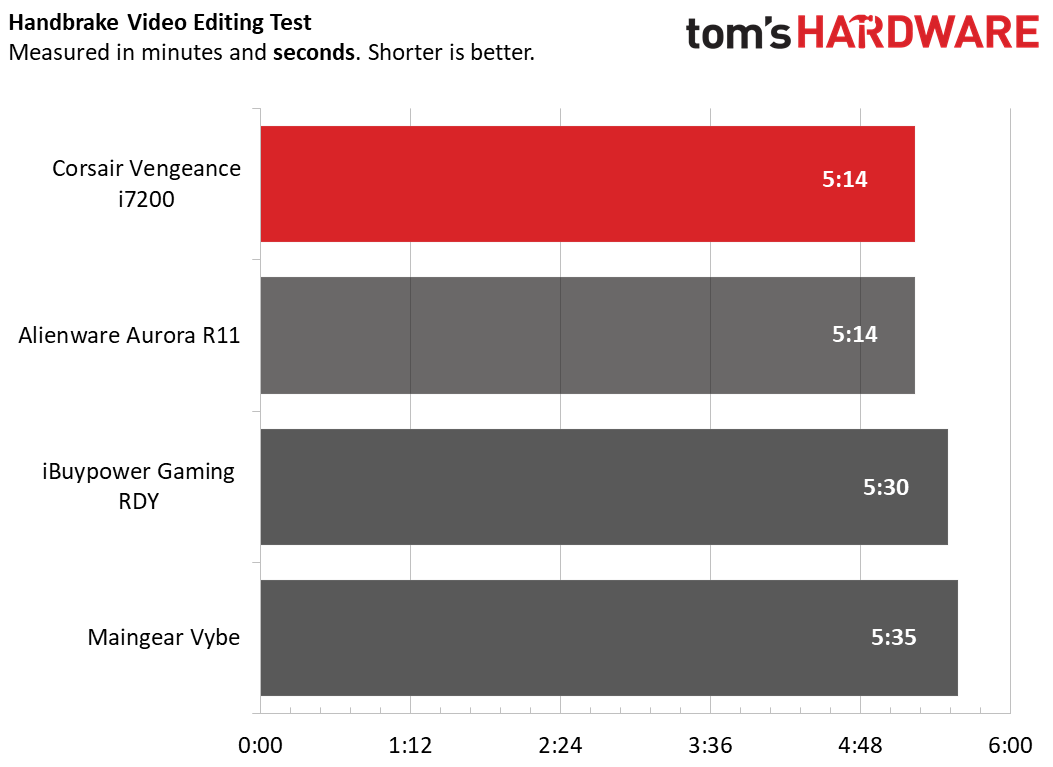
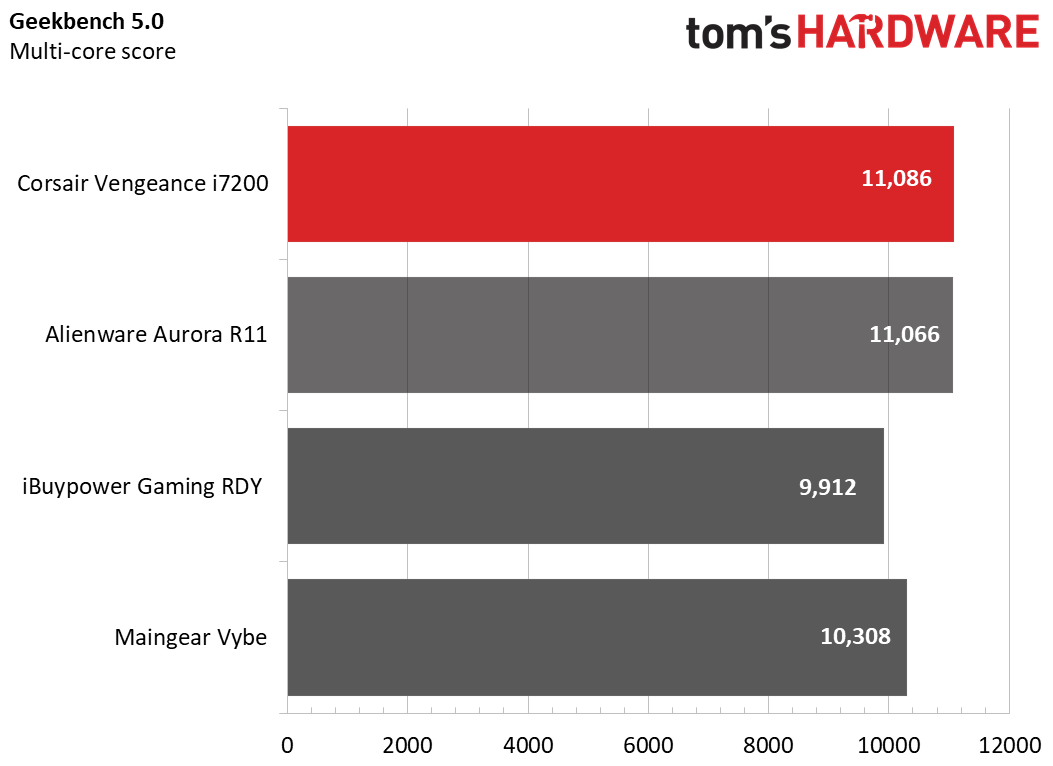
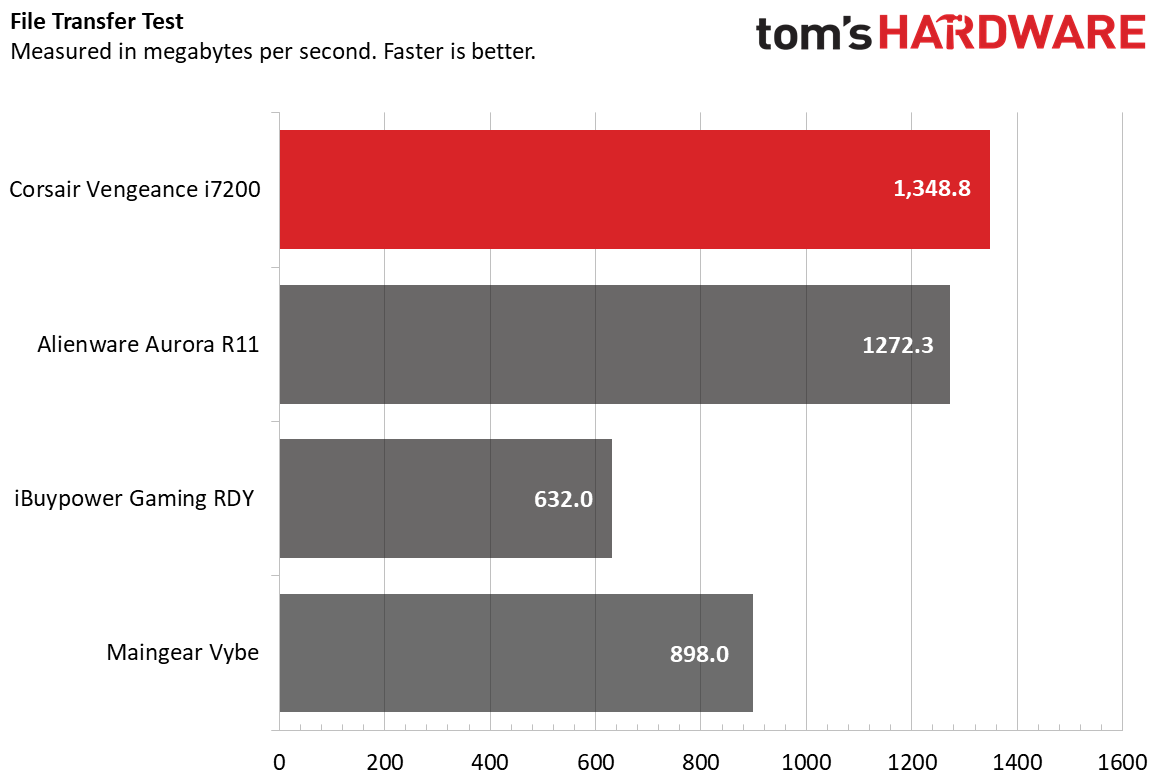
On Geekbench 5, the Corsair eked out a sliver of a win against the Alienware, with its score of 11,086 compared to the Dell machine's 11,066. But both the iBuypower and Maingear systems were fairly close, with scores at or very near 10,000.
In our Handbrake video transcoding test, the Corsair Vengeance i7200 took 5 minutes and 14 seconds to convert a 4K video to 1080p. That matched the Alienware, and was 16-21 seconds ahead of the other two competitors.
Lastly, Corsair's own Force MP400 SSD was speedy enough to sail the Vengeance i7200 to victory in our file transfer test. The Corsair system transferred our 25GB of files at an average speed of 1,348.8 MBps. That was roughly 75MB per second faster than the Alienware, more than twice as fast as the iBuypower, and well ahead of the Maingear Vybe, which couldn't quite hit 900 MBps.
Corsair Vengeance i7200 Configurations
At least until you can find AMD's Ryzen 9 5900X and the as-yet-unreleased Radeon 6900XT in stock, Corsair's pairing here of an Intel Core i9-10850K and an Nvidia RX 3090 (MSI branded in our review system) are pretty much at the upper echelon when it comes to gaming performance (as we'll see later in testing). The only real downside is that, going for an RTX 3080 instead gives you 85-90% of the RTX 3090's performance (or more if you're gaming at less than 4K) while saving you about $800.
That said, at $4,499, this top end of the i7200 configuration stack isn't exactly aiming at value. But it isn't skimping on other key components, either. In this config, you get 64GB of Corsair's Vengeance RGB Pro DDR4-3200 memory, not one but two 2TB Corsair Force MP400 NVMe SSDs (sans RAID, so you get 4TB of fast storage), and a 1,000-watt Corsair RM1000X power supply.
Those who want to spend less can choose a $3,399 model that keeps the 3090, but opts for a single 1TB SSD and a 2TB hard drive, while cutting the RAM capacity in half to 32GB (which is still more than plenty for gaming). And a $2,799 option makes the previous component sacrifices while also dropping down to an RTX 3080 (and opting for a lesser 750W PSU). Given what we know about the 3080 delivering the vast majority of performance of the 3090 for a lot less, there's little doubt that the 3080 configuration is a much better value. But as someone who more or less gave up slow spinning hard drives years ago, I love that our test configuration ships with a roomy and speedy 4TB of solid-state storage.
Software and Warranty for the Corsair Vengeance i7200
Corsair sells the Vengeance i7200 with a two-year warranty, which is better than the one year you get with Dell/Alienware, but not as good as the three years that comes with the iBuypower RDY system we reviewed recently.
As for software, Corsair keeps things pleasingly minimal. You get Corsair Diagnostics for system checkup and maintenance and iCue for monitoring temperatures and controlling the RGB lighting for the six fans (and whatever other compatible devices you plug into your Vengeance). Even the usual Windows bloat is minimal; I saw no sign of Candy Crush or other games, just a shortcut to buy Office.
Cost Considerations and Bottom Line
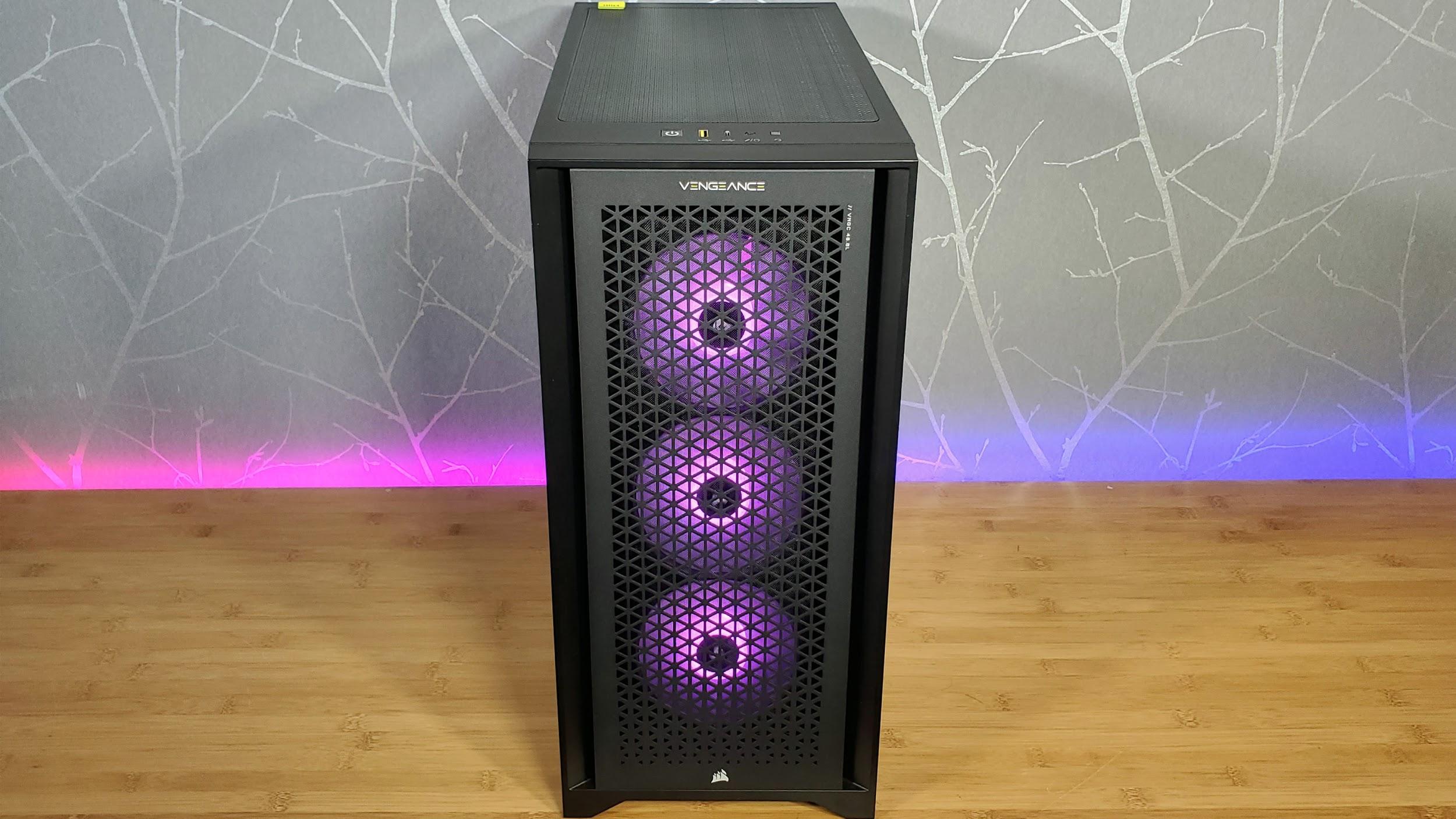
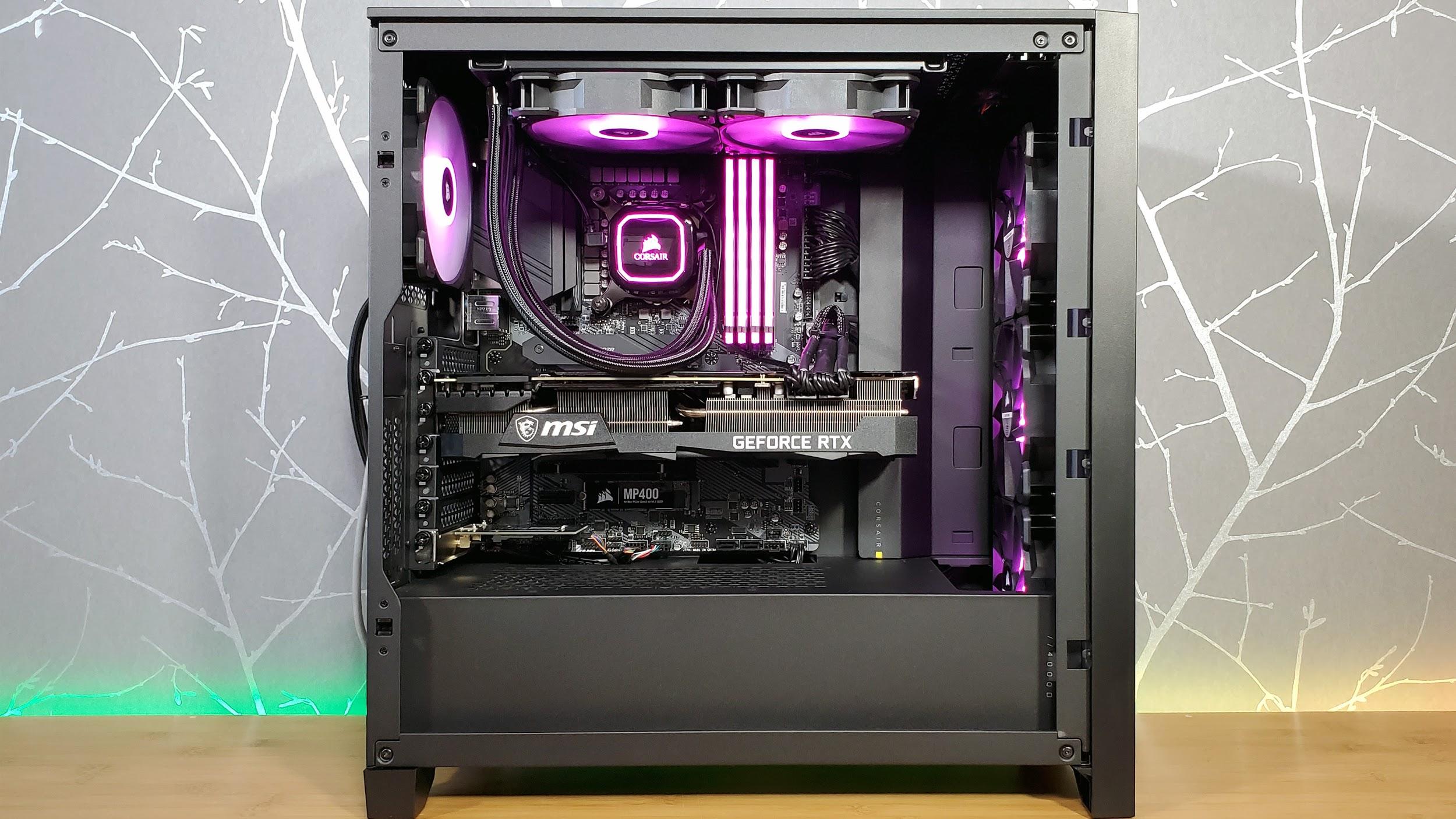
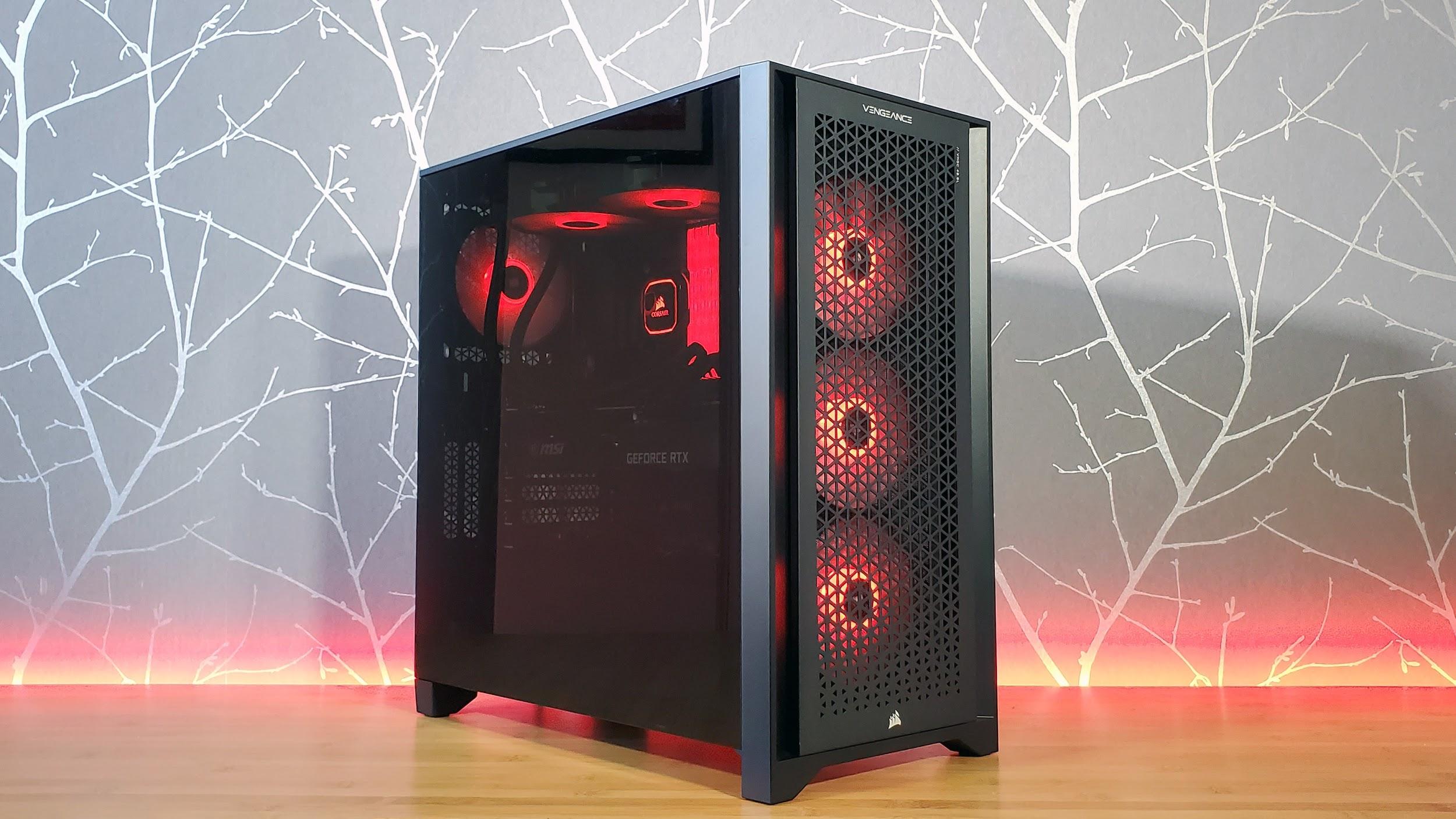
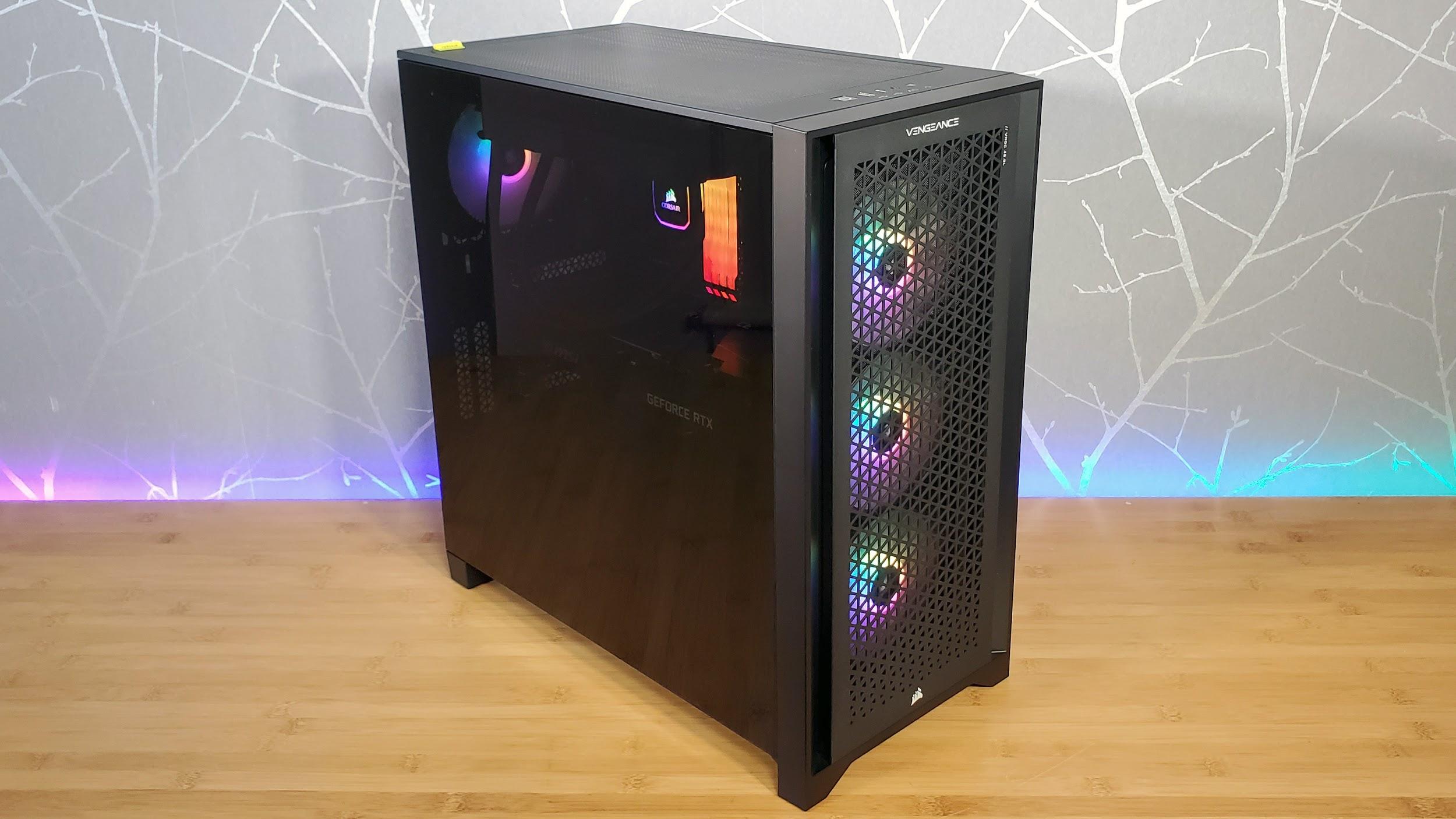
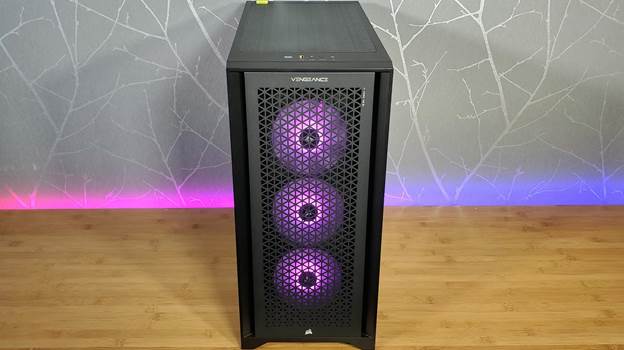
Much as we said when looking at the iBuypower RDY system recently, given the ongoing scarcity of RTX 3090s and the exorbitant prices people are selling them for on eBay and elsewhere, it’s tough to put a concrete value on the parts that make up the Corsair Vengeance i7200. Most on sites like eBay seem to be selling 3090s for $2,100 and up.
But let's say you pretend you could find MSI's RTX 3090 Ventus 3X for, say, $1,600. Add $450 for the 10850K, about $510 for the two MP400 SSDS, $225 for the power supply, $290 for the 64GB of RAM, $80 for the case, $160 for the motherboard and about $300 for the 240mm cooler and six RGB Elite fans. Toss in $100 or so for a Windows licence and you're still just getting close to $4,000. Corsair may be charging a higher markup on the Vengeance i7200 than iBuypower does with the RDY we tested (especially given Corsair makes most of these parts). But you also get a more cohesive, slick ecosystem of Corsair parts that can be monitored and controlled from within the iCue software with the Vengeance i7200. And if you care about RGB customizability, it's hard to argue against the library of iCue profiles available directly from Corsair, and elsewhere.
If the $4,500 price tag scares you off or you just want a better value, consider the $2,799 model with a 3080 and half the RAM and storage. With a similar configuration to that version, the $2,200 iBuypower RDY is arguably an even better value. But its lights aren't as easy to control and coordinate and, more importantly, it hasn't been consistently in stock since we reviewed it. At least as of this writing, Corsair's Vengeance i7200 is one Ampere-based gaming beast that you actually can buy now.
After a rough start with the Mattel Aquarius as a child, Matt built his first PC in the late 1990s and ventured into mild PC modding in the early 2000s. He’s spent the last 15 years covering emerging technology for Smithsonian, Popular Science, and Consumer Reports, while testing components and PCs for Computer Shopper, PCMag and Digital Trends.
